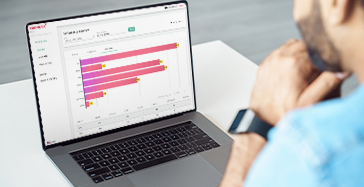Thought Leadership
The Post-COVID World Will Require Hotel Automation

Can you recall the last time you figured out math in your head, dusted off a map to figure out how to get somewhere, or even went to the bank? Me either. Technology has invaded our fast-paced lives making things easier and less time-consuming. We couldn’t imagine, even a decade ago, tasks and tools that once seemed routine would be possible to do with the help of a small gadget.
Our life is wholly digital nowadays and it has changed the way people interact, shop and travel. We no longer do simple things like remembering a friend’s phone number – heck, even a spouse’s number! Streaming services, web archives, and easy-to-purchase downloads now mean the timing of a TV show barely matters anymore – and there’s certainly no need to worry about remembering to hit record on the VHS of your favorite show. Automatic recording of data is now expected.
We all live in a world of digital self-service. But what we are really experiencing is automation. Every time we interact with a service app or website, we are actually executing an automated process on a server that was probably once done manually somewhere at some time in the past. For example, the manual booking services of travel agents used to be essential for any vacation, but online booking has automated the research and purchase function that used to be manually executed.
But believe it or not, hotels have just dipped their toes into automation-driven efficiency. For example, the manual check-in and check-out process has not really fundamentally changed since, well… ever. Waiting at a counter to show ID, provide credit card details and other menial credentials to be incorporated into a database and receive a key card – no longer makes sense.
But that is changing. Some hotels have removed the front desk entirely and rely on self-check-in kiosks or mobile check in exclusively. Pre-COVID, this set-up was an option for boutique hotels looking to reduce overhead. Post-COVID, self-service front desk interactions now seem like a best practice for health and safety.
Pre-COVID, hoteliers defined the guest experience by their personal interactions between guests and staff, believing that long-standing traditional values can only be successfully delivered and received as a face-to-face interaction. Not only has the hospitality landscape outgrown those behaviours, but this is precisely the hotel industry’s most vexing paradox right now. Check into most hotels today and you are greeted by a masked attendant standing behind a sheet of plexiglass. So much for a personal service experience. So how do you give customers what they want when the pandemic has turned the cornerstone of your service offering upside-down? Automate.
Back-office automation ultimately reduces the number of people in the hotel lobby, long waiting lines and queuing issues during peak times at reception. Automation of room assignment, upsell decisions and credential and payment collection allows hoteliers to reduce the number of touchpoints within a hotel and help safeguard and welcome returning guests.
Prior to the coronavirus, travellers were already becoming accustomed to using their smartphone to interact with the world around them. For this tech savvy cohort, who are adept at finding, arranging, doing practically whatever they want via their mobile devices, the front desk provides no additional value-add. As guests look to travel again in the midst of the pandemic, self-service contactless options will become much more of a universal demand, if not an absolute necessity, as health, hygiene and safety are primary concerns. In fact, numerous industry associations, including the American Hotel and Lodging Association (AHLA) and the U.S. Travel Association, have recommended contactless technology as a critical component of social distancing and enhanced hygiene protocols.
Summary
Hoteliers now need to re-examine their traditional notions about operations and look towards technologies that can automate manual processes that have become not only inefficient, but also undermine more important efforts to reduce interpersonal contact and improve health and safety. Look at what your staff is doing. What can be automated so that your guests can conveniently use their phone in a safe, self-service environment? Your guests won’t think your hotel’s service levels are diminishing – they will thank you for moving forward in the digital world with them.


